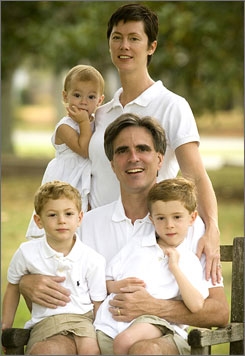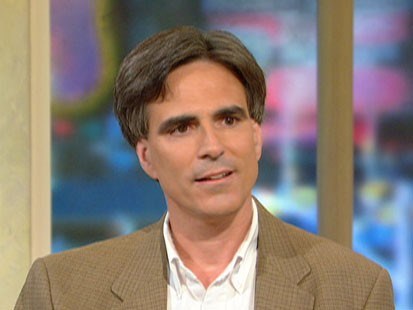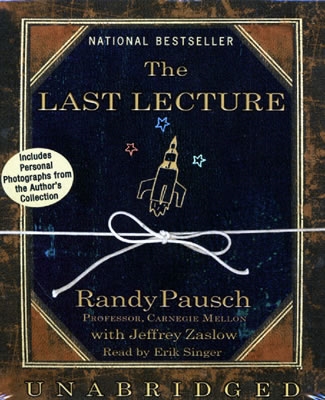 |
| This is the Pausch family posing for a picture. (http://images.usatoday.com/life/_photos/2008/07/25/pausch-familyx.jpg) |
Randy Pausch once said, “The brick walls are there for a reason. They are not to keep us out. The brick walls are there to give us a chance to show how badly we want something. Because brick walls are there to stop the people who don’t want it badly enough. They are there to stop the other people.” This quote means that in order for someone to get something they truly desire, they cannot stop when life gets tough. This description fit Pausch’s personality to a T. Pausch was born on October 23, 1960 in Baltimore, Maryland. He graduated from Oakland Mills High School and completed his undergraduate degree in computer science at Brown University. He later earned his doctorate in computer science from Carnegie Mellon (“Randy Pausch”). He started teaching at Carnegie Mellon in 1997. After marrying Jai Glasgow, he and Jai had three children: Dylan, Logan, and Chloe. He died of pancreatic cancer on July 25, 2008 in Chesapeake, Virginia. Before Pausch died, all but a couple of his lifelong goals had been accomplished, most having to do with helping others. He was also a successful professor who devoted his life to teaching others and doing everything he possibly could to help his students. With his selflessness and open-mindedness, he was able to accomplish these goals of bettering his own life as well as other people’s lives, pushing through any obstacle along the way.
 |
| This is Pausch talking to an interviewer (http://rayaprolu.files.wordpress.com/2010/08/randypausch.jpg) |
Randy Pausch always found ways to redirect the attention people gave him toward helping people in every way possible, even though he had many goals for himself. As a professor, he was asked to give a “Last Lecture” to manifest what he thought to be the most important advice that can be used in life: “On Sept. 18, 2007, only a month after doctors told him that he had three-to-six months to live following a recurrence of pancreatic cancer, he presented a lecture called “Really Achieving Your Childhood Dreams” to a packed auditorium at Carnegie Mellon” (An Enduring Legacy). Even though Pausch’s doctor diagnosed him with cancer, this didn’t stop him from giving his Last Lecture. This was an admirable quality because there are people in the world who would have given up and would not have gone through with the lecture, yet he decided to do it because he cared about how other people lived their lives and how they set goals for themselves and wanted to give them advice. By giving his lecture, Pausch was not only speaking to the audience, but also to his kids, Dylan, Logan, and Chloe: “In his “last lecture,” he was thinking of his own three children, all under 6, as he talked about dreaming big, taking risks, expressing gratitude, staying positive” (Randy Pausch: childlike wonder in the face of death). He didn’t focus on the fact that he was dying of pancreatic cancer and didn’t pity himself. He wanted no sympathy, but to inform people of ways to achieve their dreams and ways they could help themselves. In addition to helping strangers, Pausch also wanted to help his kids. Even though he wouldn’t be able to talk to them face-to-face, they would get to watch the video of the speech when they grew up. Pausch was selfless because even though he had many goals for himself, he always found a way to focus on helping people in any way he could. He also didn’t let the fact that he had pancreatic cancer affect how he lived his life and how he treated other people.
 |
| This is the book Pausch published. (http://www.audiobooksonline.com/media/The-Last-Lecture-Randy-Pausch-Jeffrey-Zaslow-unabridged-compact-discs-Hyperion-Audiobooks.jpg) |
Pausch always pushed himself and others to believe destiny could be controlled by recognizing the consequences of actions: “If you lead your life the right way, the karma will take care of itself,” Pausch said. “The dreams will come to you”” (An Enduring Legacy). He took pride in believing in things other people didn’t believe in. One of his beliefs was in karma. He lived life to the fullest and hoped for the best outcome by setting high expectations for himself and being the best man he could possibly be. Without this mindset, he wouldn’t have been so successful in life. Pausch had the spirit of a child, meaning he always pursued his goals and dreams, no matter how many people shot him down: “He encouraged viewers to maintain their childlike wonder, to keep a crayon in their pockets as a tangible reminder of childhood” (Randy Pausch: childlike wonder in the face of death). Pausch told listeners that being a child at heart was crucial to being happy and successful. He said to dream big and to set reachable goals that are not simple, yet not too ambitious. The key to setting goals is finding a happy medium. If one sets goals that are too simple, they will never be challenged. On the other hand, if one sets goals that are impossible to achieve, they will become easily frustrated. By being open-minded, Pausch entered a whole new world of creativity and imagination. He bettered himself by caring about other people so life would, in return, care for him.
 |
| Pausch with his son, Dylan, playing with dolphins (http://cheerfulmonk.com/wp-content/uploads/2008/07/randyanddylanwithdolphon-438.jpg) |
Using his public speaking skills and ideas on how to live life, Pausch inspired many people to take action, set goals, and dream big, doing things along the way they never thought they could do. Even though he was diagnosed with pancreatic cancer, he didn’t let this stop him from obtaining the goals he had since his youth. His Last Lecture focused solely on achieving dreams and not on handling death. Pausch believed that to have good karma, one must perform good deeds. He did exactly this: “He spent his last months focused on making final preparations and savoring time with his wife and children” (“Randy Pausch”). Although Pausch became famous overnight, he decided he wanted to spend his last few months with his family. To him, doing this lecture was not about the fame, but about leaving behind a way for his children to remember him and learn from the things he said, even when he wasn’t physically there. “One viewer moved by Pausch’s message was Becca Hallock whose sister had terminal cancer. “We can only hope to go with some dignity and Randy’s speech leads us to thinking about that dignity before we’re finally confronted. Hopefully, his story will lead more of us to figuring out, before it’s too late, what we each have to do before we shed this mortal coil”” (Randy Pausch: childlike wonder in the face of death). Becca was inspired by Pausch’s story. Through his lecture and book, he helped her overcome the tragic loss of a loved one. The resources Pausch created are useful to everyone. They are easily found and provide tips about achieving your dreams and overcoming obstacles. Many people thought he set his goals too high or made them unattainable. Pausch felt otherwise. He was living proof that these things are, in fact, possible. It was not that he possessed superpowers, but that he never quit or gave up on his dreams no matter what anyone said about them. This is a quality true heroes possess; the ability to knock down brick walls life builds with all possible strength, proving they are worthy of being successful.
An Enduring Legacy. Carnegie Mellon University, n.d. Web. 28 Mar 2011.
Mann, Wendy, “Leaving your legacy.” Rural Telecommunications 28.2 (2009): 6. General Reference Center Gold. Web. 28 Mar. 2011.
Martin, Douglas. “Randy Pausch, 47 dies; his ‘Last Lecture’ inspired many to live with wonder.” New York Times 26 July 2008: B16(L). Gale Opposing Viewpoints In Context. Web. 30 Mar. 2011.
“Randy Pausch: childlike wonder in the face of death.” Success (2008): 15. General Reference Center Gold. Web. 29 Mar. 2011.
“Randy Pausch.” Newsmakers. Vol. 3. Detroit: Gale, 2009. Gale Student Resources In Context. Web. 24 Mar. 2011.
Treble, Patricia. “His final words: a dying prof charms millions with his lecture, a eulogy for his kids.(MEDIA)(Randy Pausch).” Maclean’s. 120. 43 (Nov 5, 2007): 46(1). Student Resource Center – Gold. Gale. DEL NORTE HIGH SCHOOL. 30 Mar. 2011.
Page created on 4/25/2011 12:00:00 AM
Last edited 4/25/2011 12:00:00 AM
